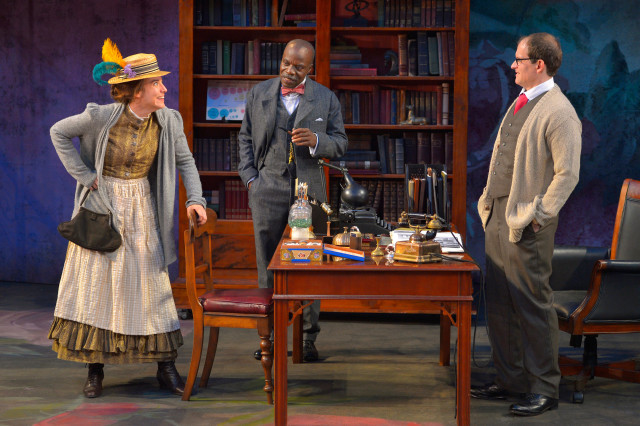Pygmalion
By George Bernard Shaw
Directed by Jonathan Moscone
California Shakespeare Theater, Orinda
July 30–August 24

(L to R) Irene Lucio as Eliza Doolittle, L. Peter Callender as Col. Pickering, and Anthony Fusco as Henry Higgins in California Shakespeare Theater’s production of Pygmalion, directed by Jonathan Moscone; photo by Kevin Berne.
The word Pygmalion does not resonate with most young people, myself included, but about halfway through enjoying the show at Cal Shakes’ eucalyptus-nestled outdoor amphitheater, I realized I was no stranger to the story—indeed, I’d seen its spinoffs many times as a child: in My Fair Lady, Pretty Woman, and She’s All That. Little did I know that while I was starry-eyed for Freddy Prinze, Jr. and Paul Walker (R.I.P.), I was watching a watered-down version of a story rooted in class and feminist criticism. As a socialist, activist and playwright, Shaw was very concerned with class privilege and gender roles. And the show features a powerful female lead, uncommon for the Victorian era in which the play is set.
Pygmalion tells the story of a poor flower-seller named Eliza Doolittle (played here by Irene Lucio) who happens upon phonetics professor Henry Higgins (Anthony Fusco) on a rainy London day. Professor Higgins, a self-involved and arrogant man, makes a bet with fellow linguist Colonel Pickering (L. Peter Callender) that he can take the cockney girl and pass her for a duchess. Cockney (which is a pejorative for city-dweller) was used in the play to describe the common or working class people of London. As the professor points out each person’s place of birth and rearing based on their accents, he classifies and ranks them.
The idea that class affiliation is determined by speech remains true today. Vocabulary and accent are telling of not only where one was raised, but are also features that others use to judge class status. The notion that Professor Higgins could turn a cockney flower-seller into an “artificial duchess” reflects a belief that language guides class assignment more than intelligence. Indeed, if a cockney girl with no education can be perceived as upper class, high society is really a series of tricks rather than something unattainable to the lower classes.
When Eliza arrives at Higgins’s doorstep and asks for speech lessons, she has no idea she will be used as a subject in Higgins’s experiment. Eliza wants something much more empowering and practical: a job in a brick-and-mortar shop, a step up from selling flowers on the streets. Like the innumerable poor in London in the Victorian era, Eliza looks for a way to escape poverty. She does not wait to be offered the chance to be “saved”; she actively seeks out a better life. Higgins threatens Eliza by telling her if she fails as his subject she will be thrown in the Tower of London, and she agrees anyway.
Eliza Doolittle’s strength has been lost on modern Hollywood renditions, which is a shame and a disservice to young women. In She’s All That, the meek Laney is approached by the uber-popular Zack, who comes from a higher social and economic background. Laney, playing the Eliza role, is portrayed as a frumpy outcast, and initially rejects his help. As a popular student and a male, Zack (the Higgins here) validates Laney, uplifting her into his realm. As a helpless damsel she is demure and grateful even though her talent and personality could have elevated her, had she empowered herself.
In Pygmalion, Eliza offers to pay Higgins a meager sum for his language lessons, and is practically laughed out of the room; sixty pence to her is insignificant to Professor Higgins and his bro-mantic betting partner Colonel Pickering. After not being taken seriously, Eliza reminds the Professor of his offhand remark to Pickering that he could pass her for a duchess, and he then agrees to the proposition. Contrast this to Pretty Woman, where sex worker/damsel-in-distress Vivian (Julia Roberts) is asked by wealthy businessman Edward (Richard Gere) to become a high class girlfriend for a week. Robert’s version of Eliza is down on her luck; it takes the modern-day version of a knight on a white horse (Edward/Higgins in a white limo) to elevate her. Yet in Pygmalion there is no knight on a white horse, much less limo: no one is portrayed to be a savior because everyone is flawed. Professor Higgins gave Eliza an opportunity, but she was one who toiled for six months to train her speech. And thankfully, there are no sexual favors performed in Pygmalion.
If you tweak a few things, you can see in Eliza where Audrey Hepburn, Rachel Lee Cook, and Julia Roberts’ characters were born. Yet unlike the original Eliza, each of those women ceded power to a man, and in Pretty Woman there is even a Columbus-like note of discovery. Pygmalion‘s Eliza Doolittle is proactive and asks for a chance at (what she thinks will be) a better life. Yet Eliza is not taken seriously by Professor Higgins and is constantly put down by his incessant insults—he calls her stupid, animal-like, and says she owes everything to him. And while insults and abuse do not break Eliza’s spirit, the abuse does not go unnoticed—by the end of the play, Eliza comments that the difference between being a duchess and a flower girl is not the actual job, but rather how you are treated and perceived, thus rejecting Higgins and turning the power dynamic. Eliza states that if she can’t have kindness, she wants independence— something that very few women had in the period, including (perhaps especially) rich women.
As Eliza’s speech lessons begin, the class commentary really takes off. Professor Higgins constantly makes demeaning comments about the poor—that they have bad habits, drink their money away, and teach their children bad values. This is exacerbated by the arrival of Eliza’s father, who essentially asks for money for his daughter. Mr. Alfred Doolittle, played wonderfully by James Carpenter, is the cockney male incarnate. He is boisterous, violent, and declares that he cannot afford morals. Just as Eliza was not taken seriously because of her lower-class accent, Mr. Doolittle is belittled by Higgins and Colonel Pickering, and only receives more respect than Eliza because he is a man. Mr. Doolittle refers to himself as one of the “undeserving poor,” which is striking. Indeed, the Anglican idea that the poor are somehow undeserving people who put themselves in a position of poverty—whether due to drinking, stupidity, or plain rottenness—is still very common today. If ever a homeless person walked up to a professor of linguistics and asked for language lessons, I’m sure they would receive a brusque Higgins-style brush-off.
The message of Higgins and Mr. Doolittle’s shared rant is clear: no matter what class you were from in Victorian England, as a man there was always someone below you. None of her family look out for Eliza’s best interests, and Mr. Doolittle is satisfied with trading his daughter for the chance to binge-drink for a few days. Professor Higgins feels that he can do whatever he wants with Eliza and not consider her feelings because he has taken her out of the gutter. Higgins’s abusive social gospel is sustained throughout the play, despite criticism from Higgin’s maid, Mrs. Pearce, and his mother, Mrs. Higgins. Hence the professor is utterly shocked at the end of the play when Eliza chooses to go off on her own, instead of staying with Higgins and being treated like an indentured servant. The professor is offended by her independence and states that he regretted sharing his “Miltonic mind” with Eliza.
Director Jonathan Moscone’s rendering of Pygmalion was powerfully executed, and the actors’ costumes and period accents allowed Shaw’s critical rendering of the Victorian era to come alive. Shaw’s class and gender critiques are not lost on the cultural politics of today’s world, where the most famous women find their power in hypersexualizing themselves (Miley Cyrus, Beyoncé, etc). Eliza’s epiphany that even high-class women live in subservience to men is alive and well, 102 years later.
Pygmalion plays at the California Shakespeare Theater in Orinda through August 24th.
—

